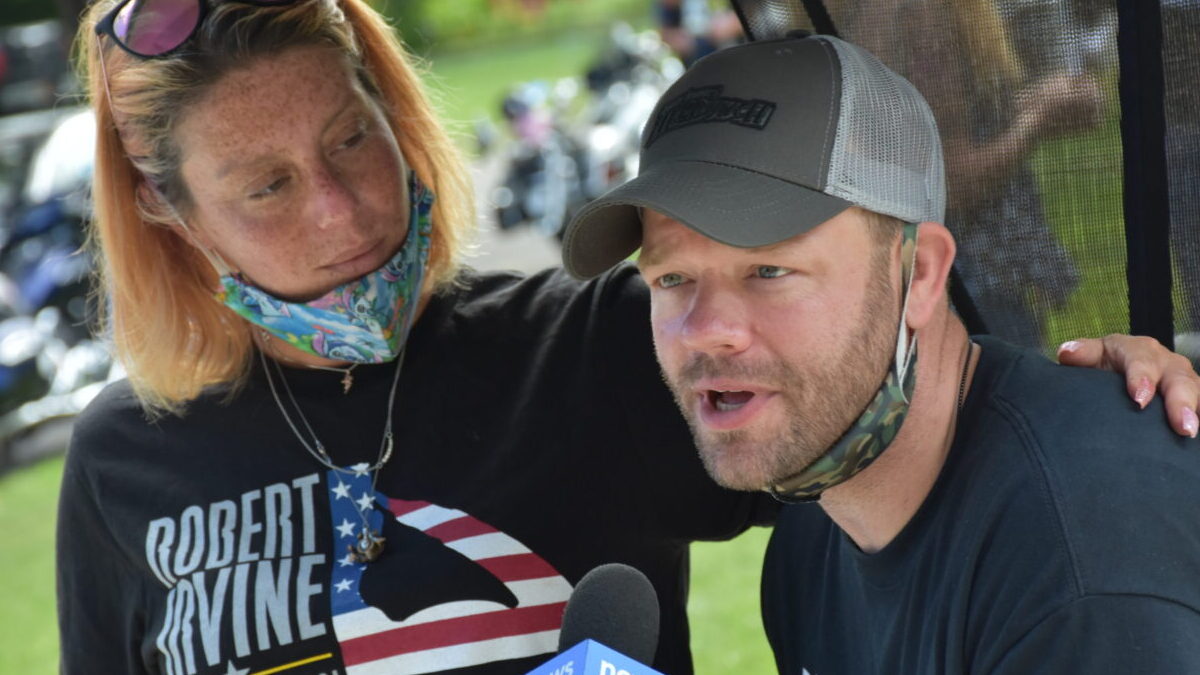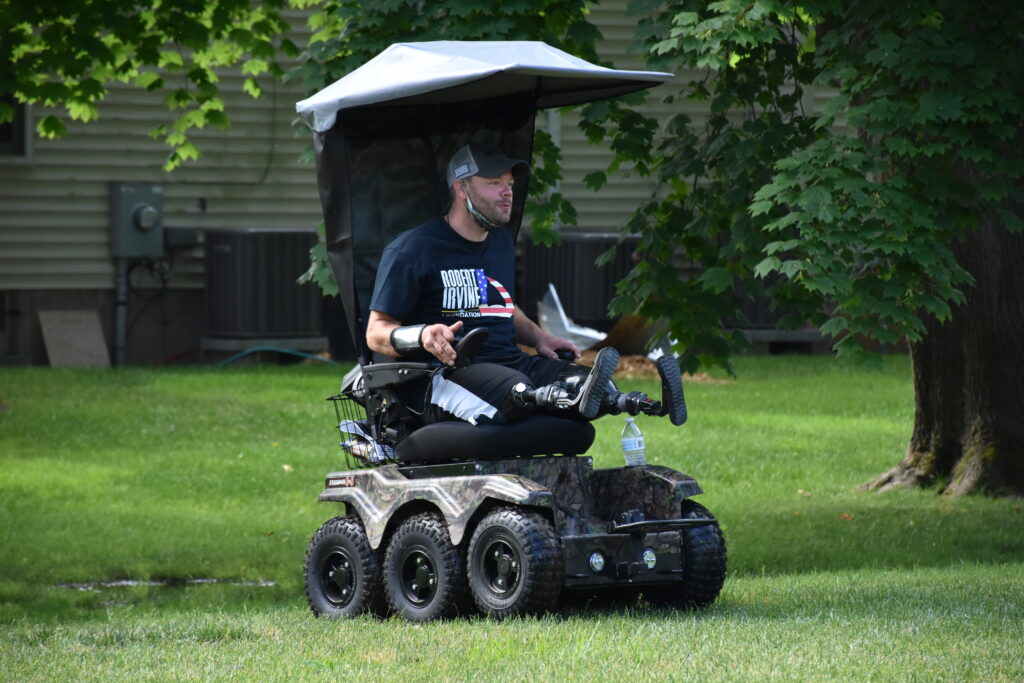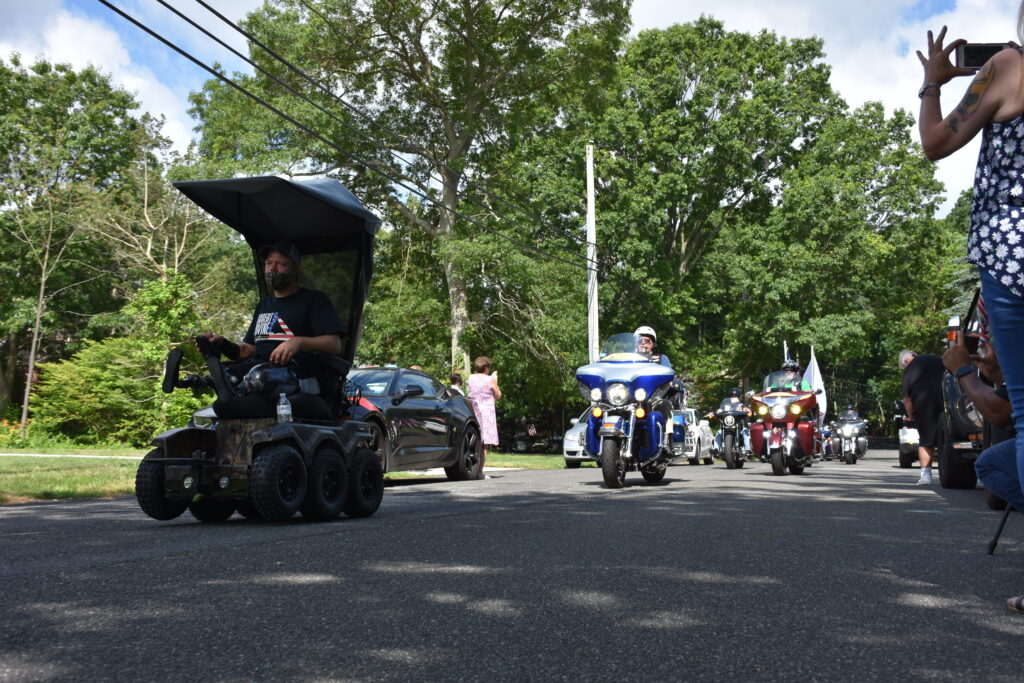
The Unstoppable Chris Levi
An indomitable wounded veteran reclaims his independence with a little help from the Robert Irvine Foundation.
BY MATT TUTHILL
A few dozen people stood in the driveway of a modest suburban home in Melville, NY. They were a motley crew—members of the local chapters of the American Legion, the Rolling Thunder, and the Patriot Guard Riders—many wearing hats and other memorabilia signifying that they were veterans of Vietnam and other wars. Clad in leather biker vests, they served as color guard for the ceremony, American flags hoisted high in the air. Their motorcycles, parked all around the property, clogged an otherwise empty street.
At the head of this assembly: retired Army Corporal Chris Levi, standing on his two prosthetic legs, cloth mask on, his FitCrunch cap held over his heart, obscuring his new Robert Irvine Foundation T-shirt. The Star-spangled Banner blared at top volume from his cellphone. When it finished, FitCrunch CEO Patrick Cornacchiulo read a brief statement, officially gifting Cpl. Levi—who lost his legs to an IED in Iraq in 2008—with a brand-new Freedom 6×6, a powered wheelchair with the ability to easily traverse any terrain.
FitCrunch raised the funds for the chair, which was purchased through The Robert Irvine Foundation.
Levi—outspoken, elegant, and heartfelt—addressed the crowd, thanking them for coming, thanking the Foundation and FitCrunch for the incredible gift, and thanking his fiancé Jenn Ryan for being his rock.
A brief reception followed. The crowd took down a tray of bagels, cupcakes, cookies, and plenty of coffee while Levi whipped around his front lawn at sometimes frightening speeds, riding it up and down hills and through thick brush. A local TV crew captured the action, which included Levi scarring his driveway with an aggressive series of doughnuts.
If the ceremony had started as a solemn moment, it was far from that now. The facts might be immutable—this was, after all, a disabled man receiving a charitable gift to improve his quality of life. And yet, it looked nothing like that. This looked a lot more like a 12-year-old getting behind the wheel of an ATV for the first time.
“You know when you hold a kid at the door before recess, how that kid is like a horse in a stall before a race?” Levi says. “That’s what I felt like! Yeah, this is going to change my life and allow me to go places I couldn’t go before, but it’s also really fun!”
Robert—who couldn’t make the ceremony due to his Restaurant: Impossible filming schedule—called Levi on FaceTime soon after he received his chair. Levi thanked Robert profusely, and Robert did the same to Levi.
“What people like Chris have sacrificed for our nation is beyond measuring,” Robert said later. “There is nothing that I or my foundation can give him that will ever equal what he gave us, but we have to find ways to say thank you. It’s my hope that every time Chris gets in his new chair, it will remind him of our eternal gratitude.”
*****
Choosing the military life was an “easy” decision according to Levi. He was always a kid who loved the outdoors and running through the woods playing paintball and capture the flag. He proved himself to be a natural leader at NY Military Academy, then a stint in SUNY Albany made him realize that he didn’t love the classroom half as much as he loved the ROTC program, where he really excelled. He left Albany for community college, then made the decision to enlist in 2003 when the United States invaded Iraq. So many people enlisted at the same time, however, that he had to wait until 2004 to enter Basic Training.
He deployed to Afghanistan in 2006, then again to Iraq at the end of 2007. During his second deployment, he would find himself in the front passenger seat of a Humvee on March 17, 2008. On that day, his unit was attached to an Iraqi Army unit, patrolling south of Sadr City, a suburb of Baghdad. A roadside EFP, or explosively-formed penetrator, detonated. In an instant, the copper plate in the EFP became a molten copper slug, tearing through the armor of the Humvee, taking off both of his legs and badly mangling his right arm.
Levi notes that the Humvee’s older equipment, which included a handheld mic with a cord resembling an old telephone receiver—and was scheduled to be replaced by a modern headset—probably saved his life.
“I was communicating to the driver and the gunner, scanning by sector,” Levi says. “If I wasn’t doing my job on that radio, I would have been decapitated by the blast.”
The other soldiers in the convoy responding to the detonation initially thought he was dead.
“They made the assessment that I didn’t look like I was alive and it looked very risky to get me out of the truck, so they took the gunner and the driver out and they were working on them,” Levi says.
Levi came to on his own and began doing what every soldier in his situation is trained to do—a manual self-assessment.
“You start at your head with your hands and work down,” Levi says. “I felt something bumpy on the inside of my thigh. At this point I couldn’t see much… so I held my hand up to my face and saw that my thumb was dangling off my arm and saw all the exposed bones in the back of my hand. This explains a little bit of the infantry mindset, or dark comedy, I guess… because I started screaming to the guys, ‘Holy shit! I’m a Terminator!’”
They heard him and came back. Eleven minutes after the explosion, a surgeon was operating on him. It was the first of 130 surgeries he would undergo after that day, 30 of which are considered life-altering.
For the next two years, he lived in Walter Reed National Medical Center. Despite the severity of his injuries, his stay should have only lasted one year. However, Veterans Affairs lost his files, compiled over eight lengthy out-processing interviews, which contained his complete medical history. He had to go through all eight of his appointments, each of which takes a month to schedule, again. For the final eight months of his stay, he didn’t live in a hospital room, but in the barracks—which are not handicap accessible—with the other soldiers stationed there.
And yet, Levi shows no trace of bitterness. Not for the bureaucratic nightmare that consumed nearly a year of his life, “Everyone there is giving 100 percent,” nor for the man who planted the roadside bomb.
“I never hated the people I fought against in Iraq,” Levi says. “The guy who blew me up? I never held a grudge against him for a second. Because I knew from the intel that we were gathering that Al Qaeda was coming and finding people in the city that had a sick wife and six kids, two of whom were dying of disease, and saying, ‘We’ll give you the equivalent of three years’ salary if you kill an American. Imagine if you were offered $300,000 to just dig a hole and put a box in there in the middle of the night, and the next day, make a phone call and record it, send it to Al Qaeda, and they’d send you money.
“That little box you put into the side of the road was a bomb, and that phone call you made killed Americans, but you have a family and kids and are being exploited by evil people. So, I don’t hate the person. I hate the organization that’s exploiting people.”
The ceremony finished with the riders mounting their bikes and forming a deafeningly loud procession that rode down Levi’s street—with Levi in his new chair leading the way.
He and Jenn were all smiles afterward, and Levi laughed when musing about all the trouble he could now cause with his new toy. Later, he plopped down on the sofa of his specially-adapted handicap-accessible home—which was gifted to him by the Stephen Siller Tunnels to Towers Foundation—and began snacking on a FitCrunch bar, part of the contents of a care package brought to him that day by FitCrunch and the Robert Irvine Foundation.
Levi, now 37, exudes an infectious positivity, gratitude, humor, and perspective that are present in everything he talks about, from our divided political landscape, “We’re 300 million siblings having a family fight—but we’re still family,” to the fact that he wants to write a book, “I’ll call it 101 Reasons Legs are a Liability,” he laughs, rattling off a series of jokes about how it never hurts when he stubs his toe and how he’s better-suited to space travel on account of only needing a three-foot bed.
“I’m not modest—I’m the most modest person you ever met!” he adds. “Seriously, though, I’m not just grateful. It would be easy to think I’m getting all of this free stuff because of how cool I am. Or I can realize that nobody is this fucking cool. Nobody deserves this much stuff for free. So it can’t be me. It’s got to be other people… and I want to find a way to pay that forward.”
Levi will now gift his old motorized wheelchair—which is equipped with treads so that it can roll on sand—to a local surf school.
“He feels like so much has been given to him and so he wants to give to others,” Jenn says. “I really admire him for that. Every day he wants to do something for someone else to make their life better.”
Levi met Jenn when he was working to establish a charity with Jenn’s mother, Lisa Ryan. That project became Long Island’s Got Your Six, a charity that aids all veterans on Long Island—not just the ones with disabilities. Lisa, whose son is in the military and was also wounded while deployed, understands how hard the military life can be and wanted to create an organization that could help with unexpected expenses and life emergencies.
“That mortgage payment that you can’t make, or that utility bill you can’t meet… that’s why we created this,” Lisa says.
If Jenn had her druthers, she would have been in the military, too, but a nasty workplace injury cut that dream short. “She always wanted that life,” Lisa says, “And she would see veterans in the street and just run up to them and give them a hug and a kiss and a thank you card.”
From the jump, Lisa knew that Jenn and Chris would be perfect for each other. She arranged Jenn to come to a benefit honoring Chris, but never introduced the two. They found each other, just as Lisa knew they would.
“They say they set us up, but if we had bumped into each other in a 7-11 it would’ve ended up the same way,” Chris says.
Without knowing that Chris was the honoree, Jenn approached him. “I saw those blue eyes and just knew that I had to get to know this man,” she says. Feeling comfortable after a brief exchange, Jenn remarked, “You know? You’ve got a cute butt.”
Without missing a beat, Chris quipped, “Yeah? You won’t do anything about it.”
Jenn responded by lightly slapping his butt three times. A moment later, she felt a tap on her shoulder. It was Chris’ mom. It was a mortifying moment or two, but the spark was real, and they’ve never looked back.
Three years later, they both look to the future with a rosy optimism. The new chair from the Robert Irvine Foundation plays at least a small role in that.
“This is going to give Chris a whole new sense of freedom,” Jenn says. “I can take the dogs for a walk and he can come with me now, whereas he would’ve been too exhausted before. Now we can go out and do so much more. We can go for hikes in state parks… the sky’s the limit.”
For men like Chris Levi, that’s always been the case.
To learn more or make a donation, visit: www.RobertIrvineFoundation.org.



